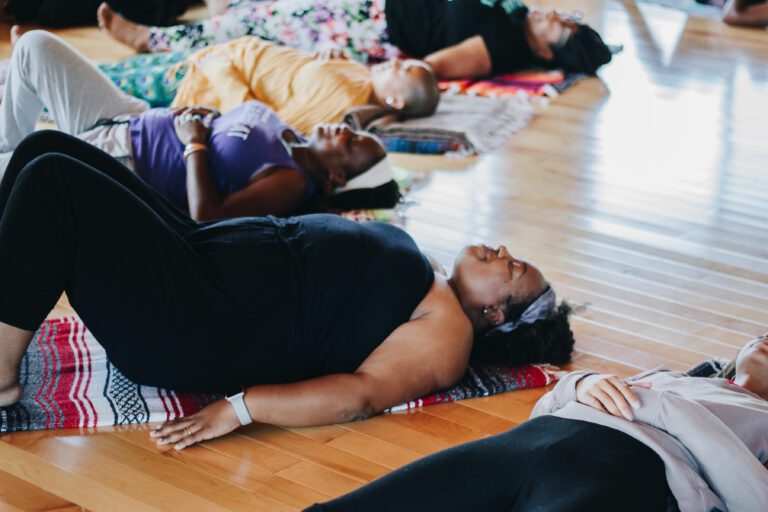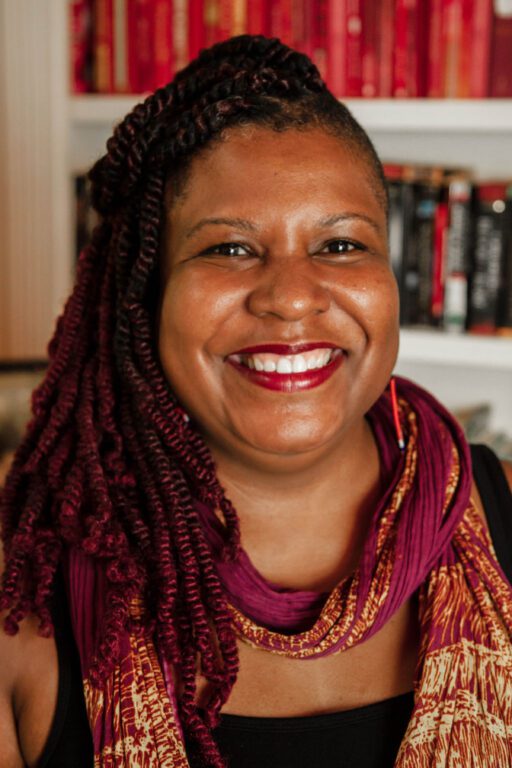
The following is an excerpt from Octavia Raheem’s new book, Pause, Rest, Be: Stillness Practices for Courage in Times of Change (Shambhala). Watch Octavia on IGTV in conversation with Wanderlust TV guide, Ona Hawk, in celebration of Octavia’s book launch.
What about when now is not an ending or a beginning? If both places are uncomfortable and uncertain, the space in between can feel like total annihilation. Like falling into a canyon: wide, deep, empty, and full. Yet, it can feel like a sliver and easy to miss if we bypass or rush through it—the liminal.
Carols of light and darkness gather and sing in this place. Not songs of grief or joy. Ecstasy or pain. Love or hate. Songs with more silence than words. Songs that pause to listen inward for tears, laughter, fear, bewilderment, despair, longing to determine if the next pulsation will be quiet or full of sound.
When now is not an end or a beginning, it is the middle of a road. This place is not to be confused with the half point because our destination is concealed, and we don’t know how far we have come or how far we have to go. The modes of travel that we have depended on are no longer reliable. Normalcy is suspended. We have been hurled into space with no promise of the way we will return or if returning is even possible.
Once we’ve entered this portal that exists between “no longer” and “not yet,” the liminal space, an initiation is underway. This is a veiled place where the world we thought we knew vanishes, and there is nothing on the horizon because the horizon has been swallowed by time. Hidden. Mysterious. Unknown of cosmic proportions.

Like caterpillars making their way toward their cocoon, we have crawled our way through endings. Yet it is unclear what we are becoming.
Caterpillars must enter a liminal space to grow their wings. In that space, they literally dissolve into goop. In that soup of slime, there are cells that will become the magnificent thing that kisses flowers in bloom—a butterfly. Those cells are called “imaginal cells.” The mystery of imaginal cells is that they are not assigned to anything in advance. They may become an eye, a wing, or an antenna. What every single cell will become cannot be determined within the caterpillar. It must disintegrate first.
It must completely break down and become unrecognizable to itself and the world.
Between endings and beginnings, our old self vanishes.
Our vision is often challenged in liminal spaces. It is where we must learn how to see in the dark. Our eyes have to adjust to the radiance within our shadows and the tenebrosity that dwells in our light.

Here we are at a departure and arrival point. Exhaustedly realizing that what worked in the past will not work here in this environment. It’s messy, and we may cry a lot. Each tear is an imaginal cell. We may endlessly sigh. Each breath is an imaginal cell. We may writhe, rage, moan, and kick about. Each movement unleashes an imaginal cell. We may crouch in the corner, afraid to move. We will most definitely lie on our sides, curl into ourselves, and call on all that is sacred to see us through. Rest and stillness allow the imaginal cells to slowly form into the signposts, paths, and vessels that point us forward.
Or perhaps we are the imaginal cell within the great organism of humanity. We have been deconstructed in order to put ourselves back together in a way that not only heals us but also our families, community, and world.
Either way, liminal space holds imaginal cells. Without it, there are no beginnings. No metamorphosis or transformation. Without it, we have no wings to rise.
Beloved, as we drop beneath the surface of what is known, we enter a place of possibility. A place where the one thing I am sure of is this: I do not know what this part of the path holds. I do know that we are held.
Everything and nothing exists here.
From Pause, Rest, Be: Stillness Practices for Courage in Times of Change by Octavia F. Raheem © 2022 by Octavia F. Raheem. Reprinted in arrangement with Shambhala Publications, Inc. Boulder, CO.
—
 Octavia Raheem is a mother, author, yoga teacher and practitioner, and activist. She has received national attention for her work training yoga teachers and diversifying the yoga and wellness industry. Her work as a yoga professional focuses on practical tools to teach individuals how to manage stress, anxiety, and fatigue through yoga and meditation in a way that is accessible to all levels/abilities, and restorative to the nervous system. Her work has been featured in Yoga Journal, Mantra magazine, Well + Good, CNN, WXIA, and Atlanta Magazine. Octavia’s first book, Gather, was published in 2020.
Octavia Raheem is a mother, author, yoga teacher and practitioner, and activist. She has received national attention for her work training yoga teachers and diversifying the yoga and wellness industry. Her work as a yoga professional focuses on practical tools to teach individuals how to manage stress, anxiety, and fatigue through yoga and meditation in a way that is accessible to all levels/abilities, and restorative to the nervous system. Her work has been featured in Yoga Journal, Mantra magazine, Well + Good, CNN, WXIA, and Atlanta Magazine. Octavia’s first book, Gather, was published in 2020.
